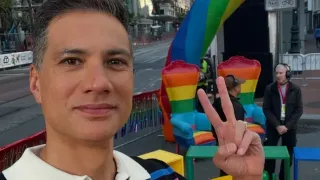November 23, 2014
CPMC's Proposed AIDS Changes Criticized
Kilian Melloy READ TIME: 7 MIN.
San Franciscans living with HIV/AIDS and advocates are criticizing changes to the way California Pacific Medical Center's Davies campus delivers some services.
Some patients of the hospitals HIV/AIDS case management program are concerned that the two workers they've relied on for years for compassionate, comprehensive help will be unavailable and they'll have to go to inadequately trained, less caring staff for assistance.
John McLay, 57, is a patient of the program and started a MoveOn.org petition protesting the changes.
McLay said, "I would have to" go somewhere else if CPMC goes through with the changes.
"I would be so upset with Davies and CPMC and Sutter Health I would likely go completely somewhere else," he added. "My greatest fear is there have been so many cutbacks in services for HIV-positive people, there is really nothing available for people 50 and over ... that the very real possibility is people will not get access to services and will have poor health" and service cuts could "possibly cost lives."
CPMC is an affiliate of Sutter Health. In a November 11 letter to a doctor at Davies, which is located in the Castro, Eileen Kahn, a registered nurse and the regional care coordination executive/vice president for Sutter Health West Bay Region, said, "For the past several years, we have seen a steady decline in the number of patients we serve in our AIDS Case Management program, in part reflecting our success in managing HIV disease."
Kahn said there are 15 patients in the program, which was established during the 1990s at the height of the AIDS epidemic and helps people, including those who can't pay for services. In 2013, according to information from CPMC, the program enrolled more than 700 clients in the AIDS Drug Assistance Program and is currently helping over 70 people in the state Office of AIDS Health Insurance Premium Program. That program pays monthly health insurance premiums for eligible California residents who are living with HIV/AIDS.
"We believe our patients would be better served by aligning them with a CPMC financial counselor who can help these patients navigate through the ADAP and OA-HIPP financial drug assistance programs," Kahn said. "We will also be providing continued case management for the remaining 15 patients via our inpatient case management and social service team at the Davies campus."
The center anticipates the transition will be effective December 1, she said.
Kahn's letter was addressed to Dr. Bill Owen, who's been an HIV/AIDS physician "since before the beginning of the epidemic" and has had his office at Davies, 45 Castro Street, since 1989, when he first met Laila Hinkle and Betty Zipkin, the CPMC workers that people are expressing strong support for.
Owen, who provided a copy of Kahn's letter to the Bay Area Reporter at the paper's request, said the planned changes are "ill conceived."
"I can understand that perhaps the people who are bean counters might want to see what they can do to cut out positions that they view as unnecessary or superfluous," Owen, who's gay, said, but he said the shift will mean ADAP clients working with counselors "who really are not equipped" for the work. They're "not familiar with the needs of these patients," he said, "and Betty and Laila do much more than just financial counseling." They also provide psychosocial support and counseling.
Inpatient social workers at the hospital are already "stretched" with the work they have, he added.
Kahn didn't respond directly to an interview request, but had CPMC spokesman Dean Fryer call.
"There's duplication of services here," Fryer said, when asked what changes are planned. "You've got two different programs, the current AIDS case management program and the larger program that's doing the financial counseling" and "helps people fill out applications for various functions."
In an email, he added, "The case management function that we provide for 15 patients will be transitioned to our Care Coordination unit within CPMC," while "the ADAP application assistance will be handled by a long-standing service provider that CPMC uses to assist patients with enrollment and eligibility issues for government programs and services."
No clients will lose services, Fryer said. Patients will call the same number, continue to visit the Davies campus, and see the same physicians.
The women's current clients "should be able to stay with them," and those clients will also have access to "a broader array of services" and "a larger team."
However, according to Fryer's email, Hinkle and Zipkin would "no longer be handling ADAP program applications."
In response to requests for comment, Zipkin sent the B.A.R . an email on which she copied Hinkle.
"We were given the Sutter Health policy and cannot speak to any media," Zipkin said.
Fryer didn't know how much money the move would save, but in his email, he wrote, "This change is not about financials. This is one of many programmatic decisions that CPMC management makes each year to better align work functions to provide greater benefit to our patients."
In the phone interview, Fryer said the staff at the larger program are getting training to assist clients.
"It's the state-required training," he said. "I don't know how long it is."
Meeting in the Works
Gay Supervisor Scott Wiener, whose District 8 includes the Davies campus, said he's requested for CPMC to come to his office and meet with him and advocates to have "an open dialogue about this proposed change." He hopes to have the meeting before Thanksgiving.
"As you know," Wiener said, there's "serious concerns in the community about the change and about the impacts on people living with HIV. I have very, very serious concerns about the change, and I want to make sure we all understand what exactly CPMC is proposing, why they're proposing it, and whether we can convince them to take a different path."
He acknowledged there's been much confusion about what exactly may happen.
"That's one of the reasons why I want to get everyone around the table, to make sure at the very least we're all operating from the same facts, because right now, I'm hearing different things from the advocates than I'm hearing from CPMC."
As Wiener understands it, Hinkle and Zipkin will be transferred or offered severance. That change and the 700 clients being transferred to a different service are "not in dispute," he said, "and we want to make sure we understand exactly what that means." He hopes the changes aren't set in stone.
Asked in part about Hinkle and Zipkin being offered severance packages, Fryer responded, "The realignment of services will happen after a transitional plan is completed. Betty and Laila have been asked to remain in Care Coordination to continue to provide exceptional care for our patients."
Strong Support
Hinkle and Zipkin are receiving strong support from the community.
In an email exchange, Dr. Virginia Cafaro, an HIV specialist, wrote, "Both Laila and Betty have worked hard since the beginning of the epidemic and have definitely played an intricate role in the survival of many people living with HIV/AIDS. It seems that the administration of Sutter West, which are the owners of California Pacific Medical Centers, sees [the women's] role only as filling out forms for [ADAP]. In truth these women do so much more, they support patients who are new to the diagnosis, who need to find an HIV knowledgeable physician, who need assistance in attaining insurance, etc., as well as counseling is an overall life issues."
Cafaro added, CPMC and Sutter "seem to think HIV is not an ongoing problem and that at a time when more people have the chance to access health they are setting up roadblocks."
McLay, the patient who started the petition, said he'd looked for a year for a psychiatrist who would take his insurance and specialized in working with people living with HIV. He said he'd given up and was "acutely suicidal," then Hinkle called him "out of the blue" and asked how he was doing. Within minutes she'd made an appointment for him with a psychiatrist.
"I think she saved my life," McLay said.
He said other staff are "not prepared" to work with the patients who Zipkin and Hinkle have helped.
Steven Moore, 58, another patient, said he's "devastated" about the proposed changes. Moore said he didn't get any letters, emails, or phone calls from CPMC about the changes. He also said he found it "impossible" that there are only 15 case management patients.
Moore said he's worked with Hinkle since he moved to San Francisco seven years ago.
"She pointed me in the direction for every possible service someone would need," he said. "I'm living on a fixed income," and Hinkle helped him with transportation, food stamps, mental health, and other matters. "She is an unbelievable wealth of knowledge for the HIV/AIDS community."
He asked, "Why would you get rid of someone like [Hinkle] except for dollars and cents? And that's obviously what it is" that's driving the transition, he said.
Moore added, "I absolutely do not believe" that clients would still be able to work with Hinkle and Zipkin. He said he's spoken with Kahn and "she's a snake in the grass. She's lying through her teeth." He said she didn't answer his questions and referred to her as "a puppet sent here to facilitate the change. She has no idea what is going on."
Fryer said, "The 15 clients that have the broad array of case management services have received phone calls" and been briefed. The hospital will follow up with them, he said.
For "the broader 700, we don't have a method to reach out to them," he said. As people approach staff for help with completing their ADAP applications, "they'll get a representative who will help them through the process. We'll make sure they get their forms in to meet the deadlines."
Fryer referred to Moore's comment about Kahn as threatening. Asked to quickly repeat his statement, Fryer said, "I can see where your story is going. You can file your story. Thank you," and hung up.
Moore said if the changes happen, "I don't know what I'm going to do. It's not over yet, and if it happens, there is going to be a firestorm and a terrific backlash, and I am going to be part of it for sure."
McLay's petition is at http://petitions.moveon.org/sign/stop-cuts-davies-cpmc?source=c.tw&r_by=9266904






